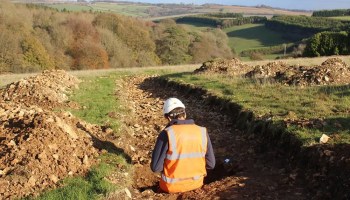Researchers Dug Up Over 10,000 Rare Roman Artifacts in the UK
Posted on Categories Discover Magazine

The side of a highway outside Gloucester, U.K. might not be the place you’d expect to find thousands upon thousands of archaeological wonders.
Yet in recent years, that’s exactly where researchers from the archaeological group Oxford Cotswold Archaeology (OCA) have uncovered thousands of historical artifacts dating back 12,000 years ago.
Ancient Artifacts from Different Ages
In advance of a highway restoration project that started in March 2023, archaeologists have discovered over 10,000 artifacts from the Neolithic, Bronze Age, Iron Age, and Roman periods, in addition to some more recent items dating back to the Second World War. Findings have included some extremely rare items, from a rare Roman-era Cupid figurine to a variety of pottery, jewelry, and brooches.
This dig site, which spans just over 85 acres, is located in the Gloucestershire region, an area known for its rich history of Roman settlements and abundant archaeological findings. Researchers say the artifacts found at the current site could help paint a clearer picture of how some of the United Kingdom’s earliest settlements came to be.
“We knew that the area had clear archaeological potential, but the results of our fieldwork have exceeded all expectations,” said OCA project manager Alex Thomson in a May 8 press release. “We have been treated to some excellent archaeology that tells a fascinating story about this corner of the Cotswolds across thousands of years.”
The Site May Have Been a Hub for Travelers
In a May 11 exhibition of artifacts discovered at the A417 project site, researchers said this roadside excavation point could be hiding even more wonders.
Read More: Archaeological Treasures Hidden Beneath the Colosseum
The site may have been a “service station” in the Roman era, providing a stopping point for people traveling from settlement to settlement, Thomson told the BBC at the May 11 exhibition. Many of the artifacts found at the site likely belonged to travelers passing through, he said.
“During excavation last summer, we uncovered an Iron Age ‘banjo enclosure’. This site likely served as a hub for significant activities like feasting,” the research team said in the release.
This figurine of Cupid, unearthed as part of recent excavations in Gloucester, England, dates back to the era of ancient Rome. (Credit: National Highways/Oxford Cotsworld Archaeology)
The diversity and rarity of artifacts found at the site is likely due to the amount of travelers from different areas who may have frequented the “service station.” The Cupid figurine, initially unearthed in 2021, is one of just 32 metal figurines found in Roman Britain that depict Cupid — and one of two such figurines found in Gloucestershire. OCA researchers say it was likely used as a token of love and passion.
Read More: Humans Shaped Ancient History Across 3 Ages: The Stone, Bronze, and Iron Age
An Area Rich in Roman History
OCA’s current dig began in advance of the UK’s A417 Missing Link, a construction project that aims to upgrade a three-mile stretch of single-lane highway.
Crucially, this stretch of highway runs through Gloucestershire County, an area with a rich archaeological history. The area is home to hundreds of archaeological sites containing artifacts from the Roman period and earlier, sparking interest from researchers. Cotswold Archaeology has made several other successful recent digs in the area, even uncovering a Bronze Age cemetery near Salisbury in May 2023.
This legacy of archaeological success piqued the team’s interest in the A417 project, and they began excavation of the area around the highway about a year in advance of when highway replacement was scheduled to begin.
Read More: Ancient Artifacts Have Been Found in the Grand Canyon, Going Back 12,000 Years
The Cotswolds region is home to many other known Roman settlements. Gloucester and Cirencester were the county’s two first Roman administrative seats, and urban excavation in these areas revealed some of the largest Roman settlements in the United Kingdom.
“Gloucestershire and the Cotswolds have a rich cultural heritage, and the [OCA] team are bringing their expertise to bear in adding to that history,” said Steve Foxley, project director for the A417 project, in the release.
Article Sources
Our writers at Discovermagazine.com use peer-reviewed studies and high-quality sources for our articles, and our editors review for scientific accuracy and editorial standards. Review the sources used below for this article: